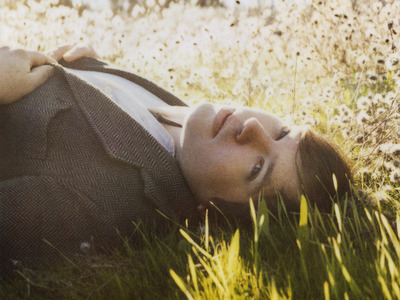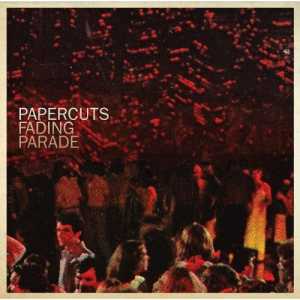Ambient and dreamlike are words often used to describe the music of the San Francisco band Papercuts; yet to place those labels on their fourth album, Fading Parade, seems to undervalue the sharp vision behind it. With Fading Parade, chief singer and songwriter Jason Quever has crafted a cohesive collection of songs that blend meditative vocals with intricate, colorful harmonies; and while Quever does have a penchant for hovering his listeners between feelings of displacement and contentment, the evocations are far too rich for dream. I spoke with the musician last month.
Ben Evans: I was reading a press release for your new album and it said that you don't like to be the center of attention. I imagine that's kind of difficult being in a band and playing shows, how do you approach that?

Jason Quever: Lots of alcohol (laughs).
BE: And you're dead serious (laughs).
JQ: I am serious, and I'm trying to figure it out. Its funny, I've been asked that question, people ask me: "What do you do on tour?" I am sure no one expects that. Yeah, it's a just coping mechanism of being in the middle of everything. But I guess there's a part of me that likes performing. I mean, I love playing music and I like conveying something to people, so not every single fiber of my being hates it. But I definitely cope by... I get more into it ya know. I have a lot of great people playing with me now, so it's like I have to step it up and try to enjoy it. If you're not having fun everyone knows it, so I can't let everyone down, all the people that go, and so I get into it just on that level, wanting to do a good job and make people enjoy that time their spending there. So, I can get into it on that level. Though, it's true that I generally don't like to be (in the middle of things). It doesn't make a lot of sense on one level of my personality
BE: It's almost as if with this record you start with one emotion and then sonically you add texture and depth and subtlety to that emotion. What is the unifying aesthetic on this record, what is its central mood?
JQ: God, it's so hard to see it for what other people might see. I mean, it's funny because if I described it, it would be totally opposite from what other people would describe it as. Whereas, for me this is kind of an upbeat record, this is an exciting record, it's more of a major key record. I mean there is a point where it gets a little darker, but for me, I found myself kind of feeling really exuberant when we were recording. Which, maybe when other people hear it, they hear this sleepy, dreamy, or whatever the word you wanna use is. But from where I'm coming from it's a more exciting record for me. I found myself sort of... just kind of throwing my arms around when I was singing and stuff like that.
BE: Do you find that establishing vulnerability as a songwriter creates a stronger bond to the music for the listener?
JQ: It's hard to... I think in my situation yes. Ya know I can only come from a place of total honesty. I don't think that's necessarily true for everybody. It's just the only way... The thing with interviews I've always thought about is that I'd love to be witty and give smartass answers but I just can't. It's the same with music, I can only be sincere and honest ya know, for better or worse, I'm not putting anything on. So it works for me, probably because I lack the wit to pull it off any other way (laughs).
BE: One of the songs I really like on the record is called "White are the Waves." Can you talk a little about the impetus for that song, and emotionally where that song came from?
JQ: I feel like musically it's some sort of nod to Kate Bush. Lyrically, it's the one song I talked a lot about with the band. I remember writing that song and saying "What is this about?" And I sort of started saying "white are the waves," and wondering what that could be. Usually I don't write that way, but it started to take shape like (Colonel) Kurtz. I think we started to think about it like Heart of Darkness, sort of like his psychotic logic.

BE: I find there to exist a tension in your music, does that make sense to you? Is it deliberate?
JQ: Ya, totally, its always the best when you're working out some problems, or some epiphany or something. Usually that's what a good song is, it feels like you've worked through something painful and come out the other end in a positive way. That's what I try to do usually. I usually try not to make it mopey, it might start out mopey, but usually I feel like the thing to try to do is make it upbeat on some level.
BE: Whats your ambition as a songwriter, if you could accomplish one thing through your work what would it be?
JQ: Man, I just think about staying alive, I feel like I'm just a survivor. If I can trick people into keep putting my records out (laughs), that's kind of my goal. I love writing so much, and I love having the funding to make records. I just feel like every song I make... it's fun, but also, I write a lot and pick the ones I think will enable me to keep making records. I just really want to be able to keep doing it, and have it be exciting for us. Ambition-wise, there are songs that I could think of that I'm like "God, I wish I could write a song that good." But that's about it really, I just wanna hit people immediately, ya know. I just like to try and write songs that come from some sort of magical place, just like Kanye or something, you hear it and it hits you so strongly. That's what I always wanna try, go for that real epiphany and magic feeling you feel when you hear Kanye or something.
* An exclusive Papercuts live session will be featured in the May edition of Fogged Clarity.
* Fading Parade can be purchased here.
